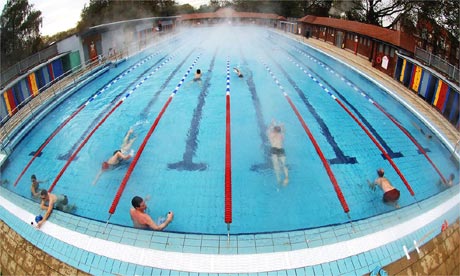
Get out of the pool The training for many sports is now complemented with other disciplines. "Pilates is great for swimming because it increases body awareness, activates the deep postural muscles and helps maintain body alignment," says Olympic swimming coach Patrick Miley. "If you put a broken, bent twig into water and tap it forwards, it won't travel far, but put in a straight twig and it will glide more easily."
Swim the new front crawl If you were taught front crawl in the 70s or 80s, you'll find a lot has changed. "Now, your eyes should be facing the bottom of the pool to lower your head and extend your neck," Miley says. "Your fingers should be relaxed and slightly apart, creating surface tension between the fingers and hence a bigger paddle."
Mix it up While long, steady sessions are great for building technique, studies on competitive swimmers show they don't make you faster. Combine with shorter sessions in which you push yourself a bit harder to work your anaerobic system, too.
Fuel up Remember your mum telling you not to eat for two hours before swimming? "It's a myth, and can affect performance because the body needs fuel," Miley says. "You can eat before a session - good foods include carbs such as pasta, baked potatoes and rice, and protein such as tuna. Cereal bars are great for afterwards; you should eat carbs within 30 minutes, anyway, to help replace lost glycogen stores."
Leap around Land-based exercises such as bunny hops are great for improving breaststroke because they mimic and boost the explosive power needed for the stroke. "Try doing six to eight, two to three times a week, leaping forwards - carefully - about a metre," Miley says.

